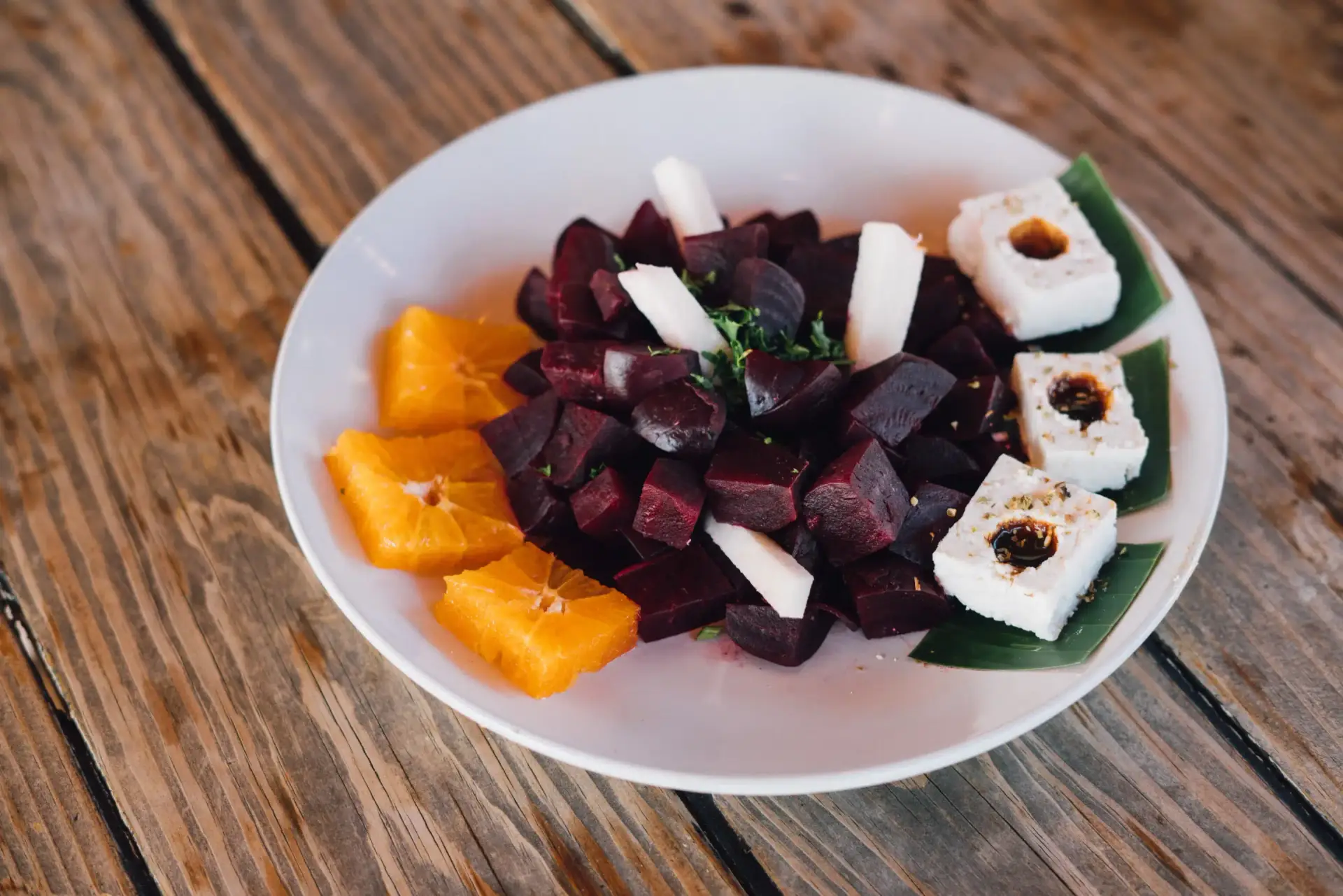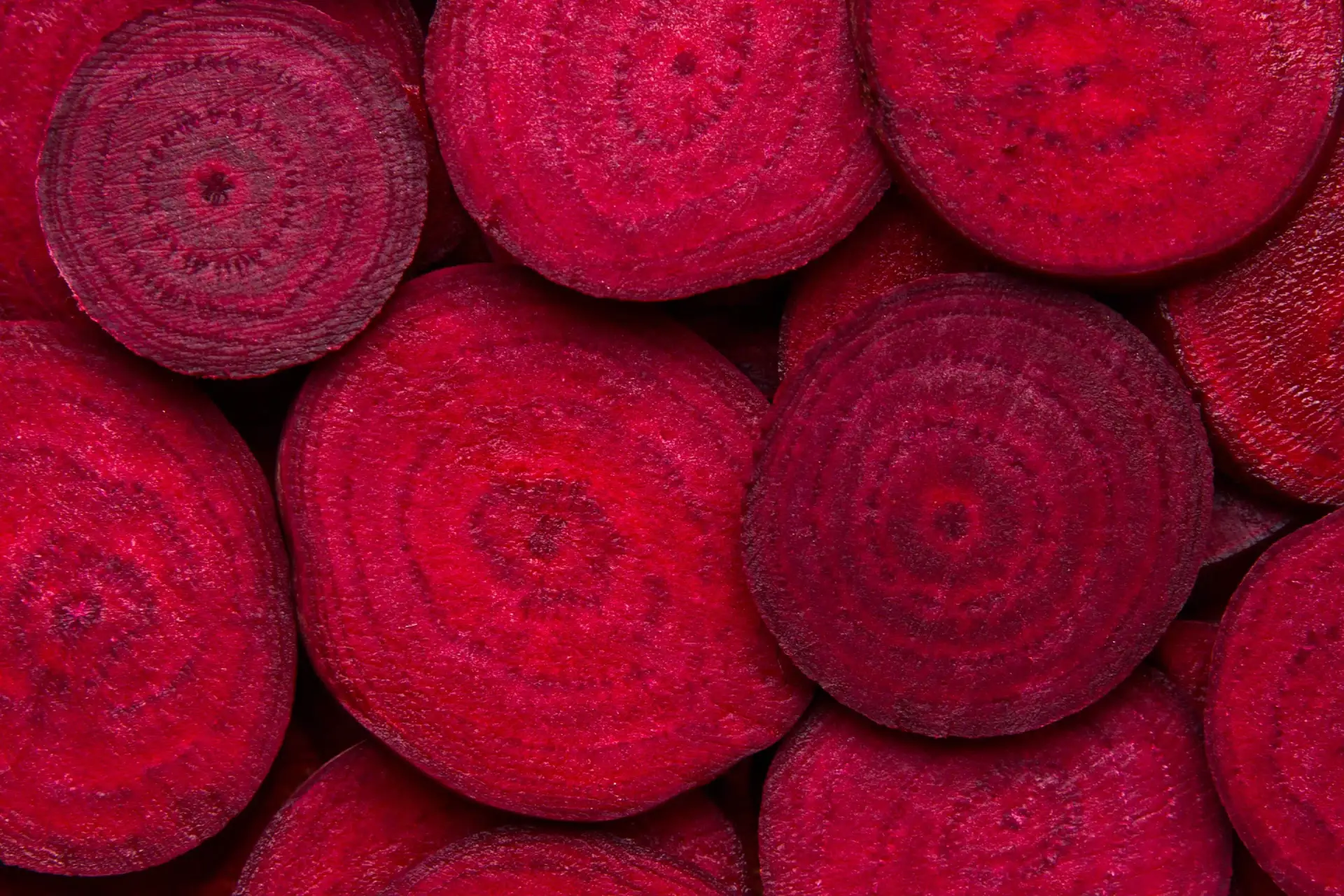Beets might not be the most popular veggie, but they’re one of the healthiest! These colorful root vegetables contain vitamins and minerals that keep your body healthy. Beets deserve a spot on your plate, whether you’re not a fan or already love them.
Beets: A Nutritional Powerhouse
This red treasure is loaded with good stuff that your body needs to stay healthy:
- Folate: This helps your cells grow and is essential for healthy growth, especially for teens!
- Potassium helps keep blood pressure regular and the heart happy. It also keeps muscles and nerves working properly.
- Nitrates: When you eat beets, nitrates turn into nitric oxide, which helps your blood flow better. It can even help you do better in sports by giving your muscles more oxygen.
- Fiber: Beets are full of fiber, which helps your digestion and keeps you feeling full longer.
- Betalains: These are unique antioxidants that give beets their red color and help fight inflammation, which is linked to diseases like heart problems.
Beets in the Mediterranean Diet

As you can see, fits right into the Mediterranean diet, which is all about fresh, healthy foods like fruits and veggies and good fats like olive oil. This diet keeps your heart healthy and helps you live longer.
Imagine a plate of roasted beets drizzled with olive oil and topped with feta cheese. Or think about a Moroccan beet and chickpea stew—sounds yummy, right? Beets’ earthy sweetness goes perfectly with Mediterranean flavors, making them a great addition to salads, side dishes, and main meals.
Fun Ways to Eat Beets
In addition, beets are super versatile, so you can enjoy them in many ways. Here are some tasty ideas to try:
- Roasted Beet & Goat Cheese Salad: Roasting beets makes them taste sweet and delicious. Pair them with creamy goat cheese for a winning combo.
- Beet Hummus is a fun twist on regular hummus. It is bright pink and sweet, making it an excellent snack or party dip.
- Beet Smoothie: Blend beets with oranges, apples, and ginger for a refreshing smoothie with vitamins.
- Beet Risotto: Want something warm and comforting? Try a beet risotto. It’s creamy, red, and super tasty!
- Pickled Beets: They give them a tangy flavor for salads or sandwiches.
Incredible Health Benefits of Beets
Adding beets to your meals gives you some serious health perks:
- Lowers Blood Pressure: According to these studies, thanks to nitrates, beets can help keep your blood pressure in check.
- Boosts Athletic Performance: If you’re into sports, beets can help you by increasing the blood flow to your muscles, which means more endurance.
- Fights Inflammation: The antioxidants in beets can reduce inflammation, keeping you healthy.
- Improves Brain Health: Better blood flow means more oxygen gets to your brain, helping you stay sharp and focused.
- Great for Digestion: Beets are full of fiber, which helps with digestion and keeps your gut healthy.
A Few Things to Watch Out For
Even though beets are fantastic, there are a couple of things to keep in mind:
- Red Urine Alert: Don’t freak out if your pee or poop turns a bit red after eating beets—that’s normal and harmless!
- Kidney Stones: Beets should be avoided if you have a history of kidney stones. They contain oxalates, which might cause stones in some people.
Time to Give Beets a Try!
The next time you’re at the grocery store, grab some beets and experiment! They’re super healthy, tasty, and can be used in many ways. Whether roasted, pickled, or blended into a smoothie, beets bring a pop of color and tons of nutrition to your meals. Your body—and your taste buds—will thank you for it!
FAQs About Beets and Their Health Benefits
- What are the main health benefits of eating beets?
Beets are rich in essential nutrients like folate, potassium, and fiber. They can help lower blood pressure, improve digestion, boost athletic performance, and reduce inflammation.
- How do beets improve athletic performance?
Beets contain nitrates, which the body converts to nitric oxide. This helps improve blood flow, delivering more oxygen to muscles and enhancing endurance during physical activity.
- Can beets help with heart health?
Yes, beets are high in potassium and nitrates, which help regulate blood pressure and improve heart health by promoting better blood circulation.
- How do beets fit into the Mediterranean diet?
Beets are commonly used in Mediterranean cuisine. They are often served roasted with olive oil, in salads, or combined with chickpeas in hearty stews, making them a perfect addition to this heart-healthy diet.
- Are there any side effects to eating beets?
Beets are generally safe but may cause red urine or stool (a harmless effect known as beeturia). If you have a history of kidney stones, you should consume them in moderation due to their oxalate content.

